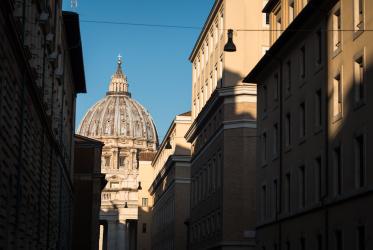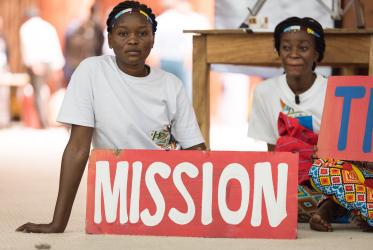Greetings of the WCC general secretary, Rev. Dr Olav Fykse Tveit, to the Synod of Bishops XIII Ordinary General Assembly on 7-28 October 2013 in Rome:
The New Evangelization for the Transmission of the Christian Faith
and at the occasion of
the 50th anniversary of the beginning of the Second Vatican Council,
the 20th anniversary of the publication of The Catechism of the Catholic Church and
the opening of the Year of Faith on 11 October 2013
Delivered by H.E. Archbishop and Metropolitan Dr Nifon of Targoviste
Your Holiness,
Your Eminences and Excellencies,
distinguished delegates and observers,
For I decided to know nothing among you except Jesus Christ, and him crucified
(1. Cor 2.2)
It is the living word of God, revealed to us in the cross and resurrection of Jesus Christ, which is the Good News, the euangellion, those who confess Jesus Christ as Lord and Saviour are to proclaim in all dimensions of their lives. There is a logic in the sequence of the theme chosen for the XII Ordinary General Assembly of the Synod of Bishops, which recalled John 1:14: And the Word became flesh and lived among us, and we have seen his glory, the glory as of a father's only son, full of grace and truth, and the emphasis on the new evangelization of this XIII Ordinary General Assembly. Justification in Christ, the proclamation of the Gospel and the call to holiness belong together in the fellowship of believers, members of the one body of Christ (1. Cor.12:12ff).
The Church is built up when people are being transformed by receiving Christ, the incarnate word of God, in the power of the Holy Spirit. People become credible and visible disciples of Christ, celebrating the Holy Eucharist, meditating on biblical texts, and witnessing to the Gospel in their homes and families, on the streets or at the workplace as workers, entrepreneurs, researchers and in so many other professions.
The Second Vatican Council stated in the Decree Dei Verbum: “The Holy Spirit, through whom the living voice of the Gospel resounds in the Church, and through her, in the world, leads unto all truth those who believe and makes the word of Christ dwell abundantly in them (see Col. 3:16)” [par. 8].
We remember the Second Vatican Council as an extraordinary moment of evangelical renewal of the Catholic Church. This was underlined by the Moderator of the WCC’s Central Committee, the Rev. Dr Walter Altmann, in his address to the recent meeting of the Committee in September this year in Crete. We expressed our gratitude and joy that through the Decree on Ecumenism (Unitatis Redintegratio) the Catholic Church opened up to the ecumenical movement and gave new impetus to the search for visible unity. The decree gave hope and inspiration to Christians around the world.
The dogmatic constitutions, statements and decrees of the Council were and continue to be not only highly relevant for the renewal of the Catholic Church, but also ecumenically. The Second Vatican Council was also ecumenical in the positive reception of ecumenical and theological research of the time, including the work of the Faith and Order Commission. Highly significant was the invitation extended to fraternal observers and the opportunities given to them to interact. Today this seems obvious. At the time of Vatican II, however, this was a remarkable sign of openness to Christians of other traditions. Their presence contributed to breaking down the dividing wall of hostility that separated us (Eph 2:14).
Inspired by my reading of the texts and the new initiatives of Vatican II, my conviction was strengthened that unity is a gift of life, given in the body of Christ where we all need one another. To work for the unity of the church is to work for the unity of all life, and to acknowledge and celebrate the diversity of life given by God, in the many cultures, contexts and languages. As the body of Christ, the Church is in solidarity with all humankind and all creation, praying to be led by God to justice and peace.
We have come a long way in these 50 years. The study on Harvesting the Fruits, which was published by Cardinal Walter Kasper, a study on Reception by the Joint Working Group between WCC and the Catholic Church, and other similar initiatives have proven how much has been achieved, but they also point to significant tasks that remain to be addressed on the way towards visible unity of the Church in one faith and in one eucharistic fellowship.
Remembering what was achieved in these 50 years, we also recognize how much the context has changed and so the conditions for the proclamation of the Gospel in the diverse cultures and societies of the world. The reality we are facing continues to change rapidly, is full of contradictions that resist simple generalizations and presents with new challenges. Your work on the New Evangelization and the now beginning Year of Faith will help all of us to learn more about the proclamation of the Gospel in the diverse contexts of today and will, hopefully, offer many opportunities for cooperation as sign of the unity that is already given to us in Christ and for which so many Christians are longing for.
May God, the Father, the Son and the Holy Spirit, be with you and bless your deliberations:
Grace to you and peace from God our Father and the Lord Jesus Christ (1. Cor. 1:3)
Your humble brother in the name of Christ,
Rev. Dr Olav Fykse Tveit
WCC general secretary



